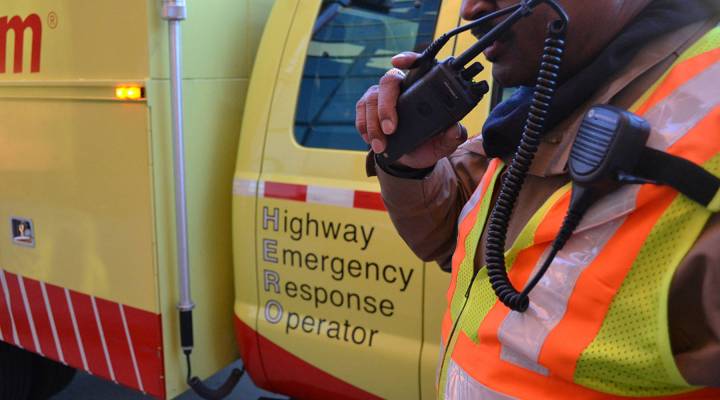
Georgia’s HERO drivers reduce road rage on highways

If you’ve ever driven through metro Atlanta, there’s a good chance you’ve suffered from even a slight case of road rage. The region consistently ranks among the most congested in the country.
But traffic in Atlanta would be even worse if Georgia wasn’t home to one of the top highway emergency response operator programs – better known as HERO.
In the middle of morning rush hour traffic in downtown Atlanta, HERO assistant manager for operations, Andre Todd, is on the lookout for accidents.
He wears an orange reflector vest over his khaki HERO uniform. He started work at 4 a.m., and in just four hours, he’s cleared three accidents. He’s one of about 100 highway emergency response operators (HEROs) who crisscross metro Atlanta, trying to keep the highways clear.
Each operator patrols one of 30 routes across metro Atlanta every day. A route can range from an action-packed four miles in downtown Atlanta to 30 miles in more rural areas.
Before joining the Georgia Department of Transportation, Todd spent 28 years as the assistant fire chief of Dekalb County. His boss, Jason Josey, leads the HERO unit. Ninety percent of his staff are former firefighters, police officers or military veterans.
“We’re kind of a hybrid. We’re this first responder agency who’s a little bit of fire, a little bit of EMT, a little bit of towing, a little bit of police – and because we’re that – we attract people from all of those disciplines,” Josey said.
HERO is part of an intricate system that includes police officers, firefighters, 511 citizen calls and hundreds of cameras on the roadways. The information all comes together at the Transportation Management Center in Atlanta.

Workers at the GDOT Transportation Management Center in Atlanta keep an eye on the roads.
It’s a dark room where operators are scanning hundreds of highway cameras on their computer monitors. Nine large TV screens overhead are focused on the busiest roads.
Georgia DOT’s social media specialist Drew Belk said that 60 percent of all traffic in the state is in metro Atlanta, so that’s where most of the cameras point toward.
“Everyone on the floor has a certain district or certain region, and they monitor cameras to see what’s going on,” Belk said. “Police and state patrol also let us know what’s happening even before we see it.”
They then relay the information to HERO drivers like Andre Todd. In addition to clearing debris and responding to emergencies, Todd tags abandoned vehicles on the side of the road with green stickers on the rear window.
“Sometimes the police, municipalities, if they’re not sure about this van, what they’ll do is they’ll come up and take a look at the date,” Todd said. “And if it’s been there for two days or so, then they may go ahead and tow it right then.”

Andre Todd spent 28 years as an assistant fire chief before he joined the Georgia DOT’s HERO program. Ninety percent of HEROs are former firefighters, police officers or military veterans.
Josey said this kind of collaboration is why Georgia’s HERO program leads the nation in clearance times.
“If there is a commercial accident that most agencies would consider to be a catastrophe, we clear that stuff in less than an hour,” Josey said.
According to the Federal Highway Administration, there are about 23 traffic incident management programs nationwide, and Georgia is on par with Tennessee and Maryland.
The history of Georgia’s HERO program goes back to the 1990’s, when Atlanta was preparing to host the 1996 Olympics. It was a time to celebrate, but also a massive logistical headache.
Georgia DOT communications director, Karlene Barron, said after the announcement was made in September 1990, funding became available to build an intelligent transportation system in advance of the games.
“There were specific locations that would have a whole lot of traffic with people going to those particular events, so there was a need to have a very detailed traffic plan and detailed response plan,” Barron said.
The state built a fiber optics network with hundreds of cameras, large digital message boards, and in 1994 the HERO program began.
It was such a success that more than two decades after the Olympics, HERO has expanded from just a dozen operators in 1994 to about 100 today.
Josey said the main job of HERO is to respond to emergencies.
Many motorists see the State Farm sponsorship logo on the yellow HERO trucks and confuse them for State Farm insurance trucks.
“We’re out there 24/7 and because of that, we have to be trained to deal with whatever we run into first,” Josey said. “It’s not always flat tires and people out of gas. We run into major blood and bone trauma incidents, and our men and women have to be able to deal with it when they get to it.”
But unlike an auto club, it’s free when you call 511 and operators help anyone on the Georgia interstates.
“It’s paid for by tax dollars – it’s a free program,” Josey said. “If you’re a citizen of the state of Georgia, heck if you’re just passing through the state of Georgia, it’s able to help them when they’re in need.”
And the need for the HERO program is constant, says Andre Todd.
“Everybody’s in a hurry to get nowhere quick, and they don’t care who they run over to get there,” he said.
There’s a lot happening in the world. Through it all, Marketplace is here for you.
You rely on Marketplace to break down the world’s events and tell you how it affects you in a fact-based, approachable way. We rely on your financial support to keep making that possible.
Your donation today powers the independent journalism that you rely on. For just $5/month, you can help sustain Marketplace so we can keep reporting on the things that matter to you.












